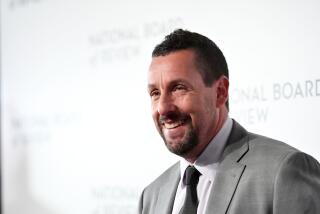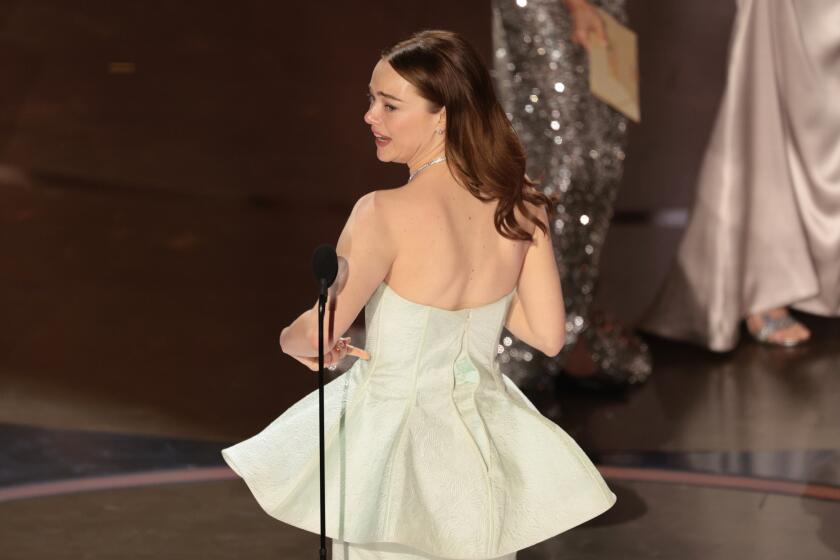Not far from the tree
In the West Hollywood offices of Jason Reitman’s production company Hard C, the power is out and the Internet is on the fritz. Reitman and his longtime producing partner Daniel Dubiecki -- whose latest offspring, “Juno,” an offbeat comedy about teen pregnancy, will screen Monday night as AFI Fest’s centerpiece gala -- are passing the time by indulging in a conversation about who brings the feminine energy to their relationship.
“I would have taken full credit for that,” Dubiecki says.
“Yeah? Until the movie?” Reitman asks.
“No, until the -- Can I just tell you?”
“Yeah?”
“Cashmere,” Dubiecki says.
“ ‘Kay? ‘Kay, buddy?”
“Oh, I bought a lot of cashmere recently,” Reitman concedes.
“That’s great. Now that’ll be the headline of the story.”
Let it be known: Reitman officially has entered his cashmere days.
Some might argue that these days began the minute he was born to Ivan Reitman, director of “Meatballs,” “Ghostbusters” and “Twins.” Admittedly, Jason Reitman did enjoy something of a unique childhood, visiting his first movie set, “Animal House,” when he was 11 days old and working as a production assistant on “Kindergarten Cop” at the tender age of 13. But he was so afraid of living in his father’s shadow that he originally enrolled in upstate New York’s Skidmore College as a pre-med student. It was only after his first semester that Ivan Reitman -- who had planned to open a chain of sandwich shops before turning to Hollywood -- shared the same advice his father had given him: “I just don’t think there’s enough magic in it for you.”
Even after Jason Reitman decided to refocus his efforts and transfer to USC to study film, he was determined to earn his own soft sweaters. “I always felt a sensitivity over being my father’s son and people feeling like the world was just handed to me,” he says.
While at USC, he started a desk calendar company, which helped him finance his first short film, a comedy about organ thieves called “Operation.” “He poured everything into ‘Operation,’ ” Dubiecki says. “He developed shingles in the middle of shooting from being so stressed and nervous, but that’s how seriously he takes it. He takes a movie on with everything he has in him.”
Rainn Wilson, who worked with Ivan Reitman on last summer’s “My Super Ex-Girlfriend” and Jason Reitman on “Juno” and an upcoming ninja project, sees how much the son takes after his father. “They’re both extremely opinionated, articulate, intelligent men,” Wilson says. “They’re not happy until they get what they want, until they see their vision.”
That tenacity of vision no doubt helped propel Jason Reitman through the making of his 2005 debut, “Thank You for Smoking.” During the five years that Jason Reitman fought to get the movie made, “we could have jumped onto any big, silly comedy you could imagine,” Dubiecki says. “We were offered almost all of the broad stuff, [but Jason] knew he wanted to make a movie that spoke to him and established who he was to the world.”
In sharp contrast to his father’s lighthearted blockbuster hits about camp counselors and ghost hunters, “Smoking” is a grown-up indie that delves deeply into libertarian politics and hinges on the relationship between a successful father and his precocious son. It became the talk of the Toronto International Film Festival when it premiered there in 2005, garnering critical acclaim and announcing the younger director as a talent in his own right.
But that film’s stellar reception raised the stakes for Jason Reitman’s follow-up feature. “Juno,” the first screenplay from Diablo Cody -- who also penned a memoir called “Candy Girl: A Year in the Life of an Unlikely Stripper” -- tells the tale of an outspoken 16-year-old (Ellen Page) who gets knocked up by her best friend, Bleeker (Michael Cera). After finding a pair of adoptive parents named Vanessa and Mark (Jennifer Garner and Jason Bateman) in the PennySaver, Juno begins a harrowing and hilarious nine-month journey into adulthood.
“I think I probably felt like I was a misunderstood kid,” Reitman says. “Perhaps that’s related to both Joey in ‘Thank You for Smoking’ and Juno in this.”
Adds Ivan Reitman: “He was always a little bit unusual, but he was always a good son. He wasn’t like a lot of other Hollywood children. He never got into trouble; he didn’t drink or do drugs. It was quite the opposite: He was remarkably responsible, and he was driven and very focused. It sort of reminded me of myself. I made my first film when I was in college, and I think he saw it as a bar that he had to blow away.”
If Reitman’s high school and early college years helped him relate to how fast Juno grows up, his current status as a new father put him in touch with pregnancy and parenthood. “ ‘Thank You for Smoking’ is a very masculine movie, and this is a very feminine movie,” Reitman says. “Maybe it’s me having just had a baby, but I think I was the least cynical person on set, and a lot of these feminine touches came from me. Diablo would say to me, ‘Man, Jason, you’re really showing your vagina on this one.’ I mean, my next film, I’ve got to go blow something up or something.”
Cody also has kinder words to say about Reitman. “He has the entire package,” she says. “He’s incredibly artistic. He’s also a total gear head, and he’s really good at bringing people together. I know that our set was notorious for being a love fest. I don’t think that’s an accident. That has a lot to do with the director.”
Page felt it too. “Jason has a huge heart,” she says. “He’s really in touch with the emotional center of these characters. I can distinctly remember us shooting the scene in the mall where Vanessa goes up to Juno’s belly [to feel the baby kick]. It was the wee hours of the morning, and I remember just the light in Jason’s eye. I hate to sound corny, but it was pretty beautiful!”
Even as Jason Reitman has come into his own on set, he has begun to realize that the shadow his father casts is not merely an artistic one. “Being a director is tough,” he says. “When I got married, my mom -- who is the wife of a director -- said to my wife, ‘Jason’s going to have an affair on you, but it’s not going to be with a woman. It’s going to be with a film.’ It puts it perfectly because even when you’re there, you’re not there. That’s what’s tough: the moments that I’m at home, I’m having dinner with her, but my mind is in the movie. It’s one thing for a marriage because you’re two adults, but you can’t do that to a child. So it’ll be an interesting balance. Somehow my dad did it. My dad’s been married to my mom for over 30 years. And he raised me, and I turned out all right. At the same time, [he] made great films.”
More to Read
Only good movies
Get the Indie Focus newsletter, Mark Olsen's weekly guide to the world of cinema.
You may occasionally receive promotional content from the Los Angeles Times.






